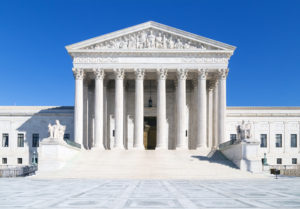
Earlier this year we shared the U.S. Supreme Court would hear a case related to online sales tax: Wayfair v. South Dakota. This ruling could settle how online purchases are taxed, potentially overturning the 1992 Quill Corp v. North Dakota ruling currently preventing states from collecting sales tax from sellers without a physical presence (or nexus) in the state.
Why is it worth it for the Supreme Court to consider this case rather than fall back on the previous Quill ruling? The world has changed a lot since 1992. As The Wall Street Journal reports, “In 1992, the justices ‘did not and could not anticipate the development of modern e-commerce,’ Solicitor General Noel Francisco wrote in a friend-of the-court brief.”
According to The Hill, “The Trump administration, several members of Congress, state governments and major retail groups want the Supreme Court to uphold a South Dakota sales tax law. They say states should be able to require the collection of sales taxes from businesses with a significant economic presence in their jurisdictions. Other lawmakers, conservative groups and e-commerce groups warn that a ruling in favor of South Dakota would wrongly chip away at limits on state power.”
Oral arguments for the case are scheduled for April 17, but in the meantime we thought it would be interesting to take a look at how the possible outcomes could affect businesses.
Sales Tax Outcome 1: Supreme Court Rules Against South Dakota
If the U.S. Supreme Court rules in Wayfair’s favor, then we are back to the same place we started:
- Quill and the physical presence standard, which currently requires a substantial physical presence before a state can require a retailer to collect sales tax, remains
- States may still pass unconstitutional laws, but they likely won’t be upheld
- States will likely pass different forms of legislation that would require onerous reporting (see our recent articles about Washington and Rhode Island) in lieu of collecting sales tax; ultimately, that would lead many retailers to file anyway so as to not have to rat out their customers
While this outcome is certainly possible, we think it’s unlikely. The school of thought among many in the industry is that, because the U.S. Supreme Court decided to hear the case, they’re likely to make some type of change to the Quill physical presence standard. Otherwise, why bother to hear this particular case after so many years of denying certiorari in others?
Still, in 1992 the U.S. Supreme Court emphasized that it is Congress that can regulate commerce among the states through the Commerce Clause of the U.S. Constitution; Congress can enact legislation to curtail the Quill physical presence requirement. They have had more than 25 years to enact some sort of change. Think of all the changes in our world in the last 25 years, and Congress still hasn’t done anything. Is it possible that the Supreme Court essentially slaps them on the hand again, rules in favor of Wayfair and reaffirms Quill? Maybe!
Some scholars and state tax professionals (us included) are amazed and frankly appalled that the U.S. Supreme Court would be so willing to hear this case as a result of state legislatures (specifically South Dakota, but also Alabama and others) that deliberately crafted sales tax legislation directly contradicting a U.S. Supreme Court decision. If the Court sets a precedent that it will not only hear a case under what is essentially extortion by these state governments, but may also ultimately rule in their favor is a bit scary. Moving away from taxes, what kind of message would that send to states who might want to reverse civil rights legislation decided by U.S. Supreme Court cases? Or discrimination cases?
Sales Tax Outcome 2: Supreme Court Rules in Favor of South Dakota
This would effectively reverse Quill and…then what? Here are some possibilities and questions we see arising:
- The concept of economic nexus (where a certain level of activity in a state – in this case $100,000 of sales OR 200 transactions) becomes a viable threshold for creating nexus and makes it a requirement for sellers to collect and remit sales tax.
- Companies selling more than a certain dollar amount into a state, irrespective of any other physical presence, would have to begin collecting sales tax and engage in the related compliance in many more states. This could create a significant burden for small businesses.
- Would the U.S. Supreme Court rule on the actual amount of activity which could create economic nexus? Is $100,000 a reasonable amount? What about $50,000 or $10,000? Could they say that even $100 of sales creates a filing responsibility?
- Could a level of sales or activity be dependent upon the size of a state? For instance, if $100,000 in sales is reasonable for a relatively low population state like South Dakota, what is a reasonable minimum in a high population state like California, New York or Texas? $1,000,000?
- Could any of the sales tax be retroactive? Could the Court rule that economic nexus is a good standard, and might always have been a good standard? After all, if you didn’t like Quill and a physical presence standard, maybe we should change it retroactively. Now, that would create some chaos!
- If not retroactive, would there be an effective date somewhere in the future, or would the ruling be effective immediately – creating an immediate filing challenge for millions of small businesses?
- The Court might take the high view of a ruling, leaving some of these questions unanswered and still send it back to Congress to iron out the details. Maybe we’ll see some action in the next 25 years?
All of this is just speculation, of course. But in any case, your company may need some help in navigating these murky sales tax waters. The oral arguments are set to begin April 17 and a decision is expected by late June. Are you ready for either scenario? Contact us if you have questions about how this may affect your business!
Miles Consulting Group, Inc. is a professional service firm in San Jose, California specializing in multi-state tax solutions. Our firm addresses state and local tax issues for our clients, including general state tax consulting, nexus reviews, tax credit and tax incentive maximization, income tax and sales/use tax planning and other special projects. To learn more, contact us today at www.MilesConsultingGroup.com.



















